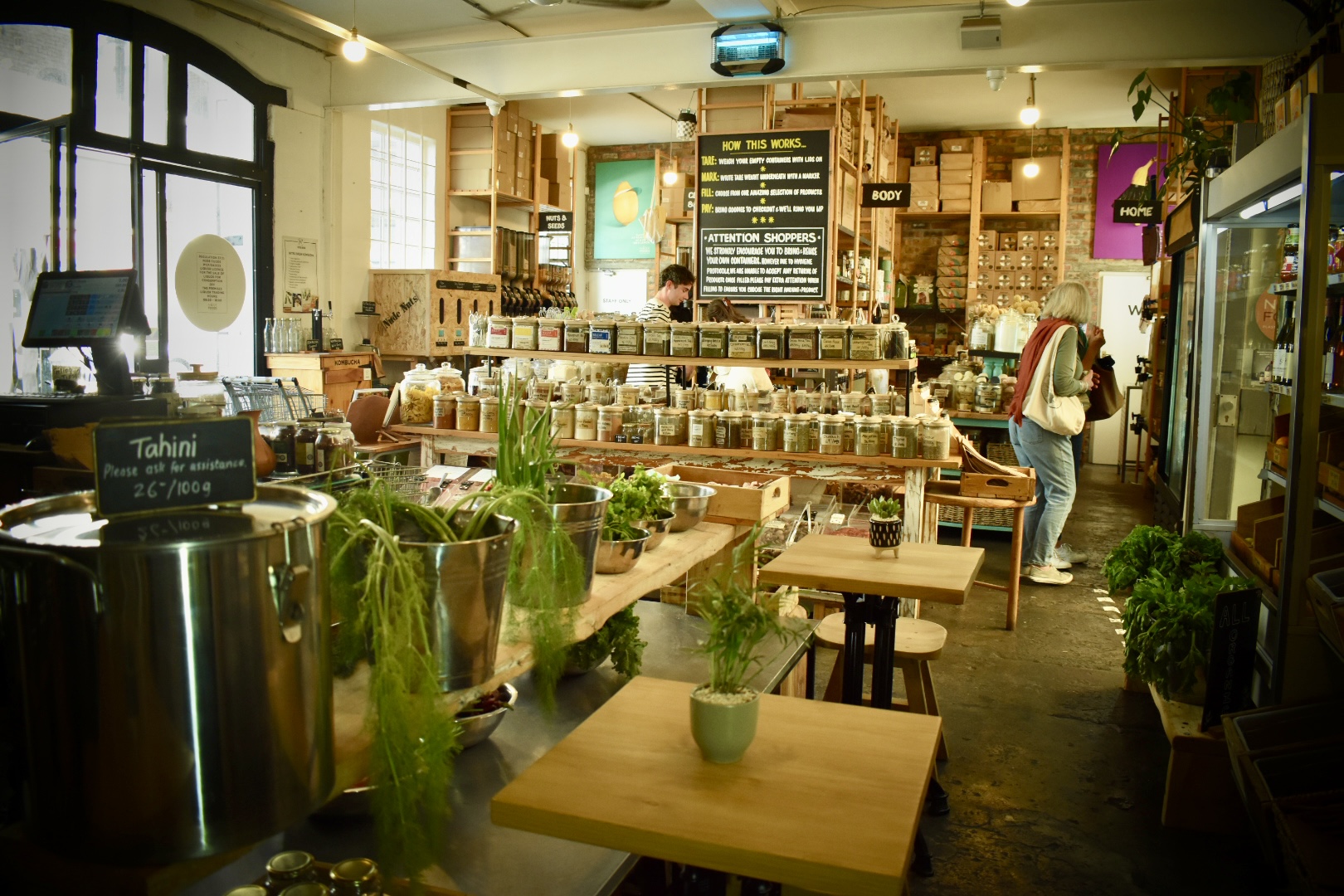”
Written by and Images byAmy Gajjar
The NUDE Revolution: A Sit-Down with the Pioneer of Zero-Waste Grocers in South Africa.
My treks on my lunch break are filled with coming and buying dried pineapple, handfuls of dates, and other delightful treats from NUDE FOODS. Recently, I had the pleasure of sitting down with Paul Rubin, the visionary owner of this unique grocery shop. NUDE FOODS, a weigh-and-measure grocery shop focused on health and sustainability, has become a beloved spot for health-conscious shoppers in South Africa. During our conversation, Paul shared the inspiring journey of how NUDE FOODS came to be, the challenges they faced in sourcing organic and sustainable products, and their commitment to educating customers about the benefits of sustainability and health.
1. What inspired you to start NUDE, and how did you develop the concept of a weigh-and-measure grocery shop focused on health and sustainability?
Paul shared that the inspiration for NUDE came from a book on zero waste by Bea Johnson, which provided not only the business idea but also a name for the concept. NUDE FOODS was founded in 2017, though Paul had initially planned to start the business three years earlier. As a plant-based consumer, he found the amount of waste from doy packs frustrating, which pushed him to explore alternatives. This led to the establishment of NUDE FOODS, offering South Africans a new way to shop. The idea of a weigh-and-measure system, reminiscent of traditional spice shops, gained significant media attention, including from The Huffington Post. This system has been particularly beneficial for students and elderly people, allowing them to buy small quantities as needed.
“Paul shared that the inspiration for NUDE came from a book on zero waste by Bea Johnson, which provided not only the business idea but also a name for the concept.”
2. Can you share some specific challenges you faced in sourcing organic and sustainable products, and how you overcame them?
Paul discussed the initial scepticism from suppliers who saw NUDE as a small, unknown business. However, they overcame this by showcasing their media coverage. Sourcing is a global effort, with legumes coming from India and a local chia seed farmer supplying for two years before they had to revert to importing. Despite these challenges, NUDE gives smaller suppliers a chance, supporting local businesses whenever possible.
3. How does NUDE educate its customers about the benefits of sustainability and health, and what initiatives have you implemented to engage the community in these practices?
Paul explained that while NUDE offers premium products, their prices can sometimes be cheaper. He addressed the misconception that their products are expensive by highlighting the correlation between food quality, price, and health.
Low-quality food often means a lower price but poorer health, while high-quality food, despite varying prices, promotes good health. NUDE’s initiatives also focus on reducing food waste and fostering a sense of community and social awareness.
4. In what ways does NUDE ensure that its operations and supply chain remain environmentally friendly and socially responsible?
Paul mentioned that NUDE strives to keep operations plastic-free, using a reusable bucket system despite the higher costs. They prioritise local suppliers, even if it means paying more, and support sole traders, especially for baked goods. Paul recommended trying their in-store shortbread made by a local supplier. He also highlighted Wild Eatery, a mobile café that joined NUDE during the pandemic, adding to the shop’s vibrant atmosphere.
“They prioritise local suppliers, even if it means paying more, and support sole traders, especially for baked goods.”
5. What future innovations or expansions do you envision for NUDE to further promote sustainability and healthy living?
Paul revealed some intriguing new products in-store, such as bamboo items, tooth tabs, and ceremonial grade cacao from Tanzania, popular among tourists. The big picture plan includes opening micro-stores run by women from marginalised groups. Although NUDE had to close two of its three shops due to COVID-19, they launched an online shop to adapt. Paul believes that while expanding NUDE significantly may not suit South Africa’s economic climate, the shop will continue to promote sustainability and healthy living through innovative approaches.
Speaking with Paul provided a deeper understanding of the dedication and innovation behind NUDE FOODS. As the shop continues to grow and introduce new products, it remains a beacon of hope for a more sustainable and health-conscious future. Whether it’s through their commitment to reducing waste, supporting local suppliers, or planning future expansions, NUDE FOODS is making a significant impact. I look forward to seeing how Paul and his team continue to lead the way in promoting a healthier, more sustainable lifestyle for all.





